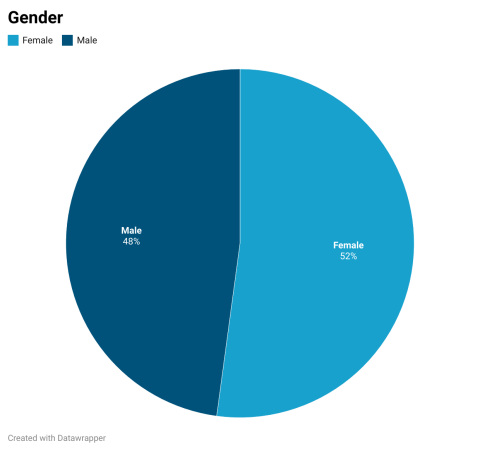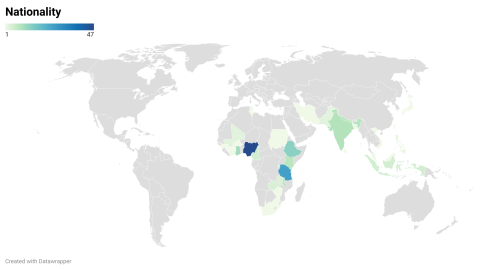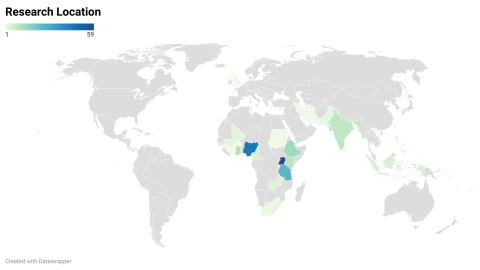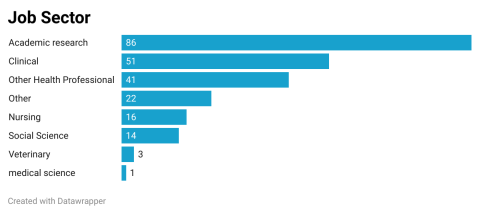Round-up: 2023 Early Career Grants programme awardees
In this blog, RSTMH Chief Executive Tamar Ghosh looks at the awardees of the 2023 Early Career Grants Programme, including where in the world they are based and their research areas.
The funding for our 2023 Early Career Grants Programme is almost finalised and, as in past years, we want to share with you key information about our awardees.
So far, we have confirmed awards to 234 early career researchers and professionals around the world, from a total of 2,127 applications. This is fantastic news and compares with 206 grants being given out last year and just 16 in 2018. We are also working with a close partner on an announcement to fund a further 25 –30 awards from the 2023 applications, which would bring our total awarded for 2023 to around 260.
We are delighted to increase the number of awards year on year, as it means more and more early career professionals have been able to evaluate interesting research questions and carry out their first research projects. Through their year-long projects they have learned new skills, had new experiences and grown their networks. For some the projects also enabled them to identify the next stage of their career, to have their work implemented or disseminated, and to start new collaborations.
It is our ambition to continue to grow the number of grants we can provide each year, as long as the demand for these early career grants continues to increase. We will shortly be announcing the number and details about applications to the 2024 Early Career Grants Programme.
Thank you to our donors
The growth in awards for 2023 is once again due to the incredible support received from our donor partners. The Department of Health and Social Care via the National Institute for Health Research has funded 214 grants, Wellcome Trust funded 14 grants, the International Trachoma Initiative (ITI) grants and The International Alliance for the Control of Scabies (IACS) also funded one grant for a Scabies project. In 2023 RSTMH funded 3 grants.
Thank you to our Global Assessors
As in all years, we are only able to deliver such a large and growing Programme due to the hard work and dedication of our voluntary Global Assessors. This network of over 70 specialists in all areas of Tropical Medicine and Global Health, and based in more than 35 countries, maintains the high quality of our Programme. They use their experience and skills to carry out detailed assessments of the projects being put forward along with the applicants themselves, ensuring we have high quality projects to support.
We would like to thank them for their time and dedication in collectively carrying out over 3,600 assessments in 2023, which is another record year for RSTMH.
In celebrating these awardees and their projects we wanted to share some more detailed analysis including the gender split, thematic areas, countries where research will be carried out and where our researchers are based, and a little more detail on the awardees themselves.
Gender split

As you can see below our grants are being provided to a group which is 52% female, and 48% male, which is consistent with last year.
We know first hand from other areas of work that it is difficult to support and recognise the success of females and males equally in our field of work. It is therefore great news to see this result for a second year, whereby at least as many females as males are funded for their first research. This compares with a split of 46% female and 54% male at application stage.
Nationality and research location of awardees

Our cohort of 2023 Grant awardees are from 30 countries, compared to 36 in 2022. Of these, around 85% are from Africa (70% in 2022), 14% were from Asia (10% in 2022). The country with the highest number of recipients is Uganda at 60, followed by Nigeria at 47.

The research location of the studies being funded is equally broad, mapping closely the nationality of our awardees, as shown below.
Research areas

This year we were able to loosely classify the studies across 112 areas of global health, compared with 67 last year. We accept this is a very simplified view of the studies which often involve multiple disease areas or topics, and which describe their focus in different ways. The most popular topic for 2023 is HIV (23) followed by Malaria (17) and Snakebite (17) and AMR (14). We were pleased to see that around 85 projects are focused on non-communicable diseases including climate change, comorbidities, disability and mental health.
Roles of awardees

One of the goals of our Early Career Grants Programme is to ensure we are providing grants to a broad range of early career professionals working in roles across the health community. When we asked our awardees to classify their roles, it included a total of 120 different descriptions. These range from students at undergraduate, post graduate and PHD levels, researchers, lecturers, policy officers, nurses, veterinary and social scientists and many other roles. Along with encouraging applications from across sectors, we want our Programme to broaden the profile of individuals who have the opportunity to deliver their first research project. We know the big global health challenges require a broad range of skills and abilities, and we are confident that our awardees will be helping future leaders and innovators in global health take their first steps in research and practice.
Similarly, we want our grants to be received by professionals working in all areas of health setting, and we can see below the breakdown for this cohort. As per last year, the vast majority of awardees are from academic settings, as we might expect for research grants. However, we are again delighted to see a number of awardees based in hospitals, NGOs, local government ministries and also industry. We continue to have big ambitions for the Programme to ensure the range of people given the chance to try research in global health is as broad as possible, to ensure the pipeline across the world is strengthened.
We wish all of our awardees the very best of luck with their projects and we hope this opportunity brings new skills, experiences and networks, alongside tangible outcomes such as scientific publications and presentations. Whatever the results of their projects, whether they are expected or not, we hope this helps them to determine the next steps in their careers, and look forward to supporting them over the next 12 months while they deliver their projects.
While we wish our 2023 awardees good luck with their projects we continue to work with our awardees from 2020 to 2022, and we look forward to sharing the success of our awardees from 2019 very soon.
